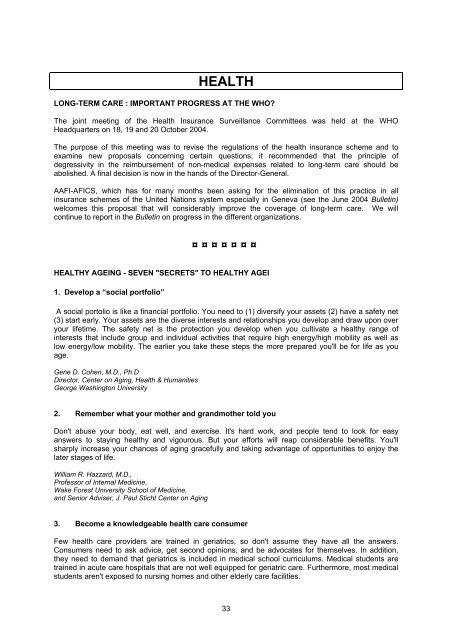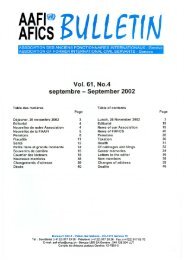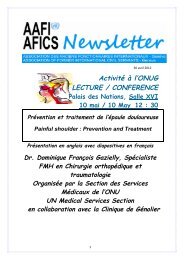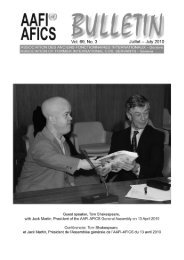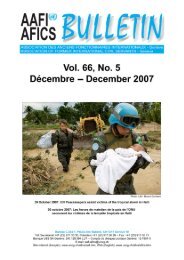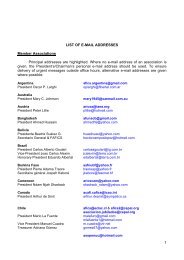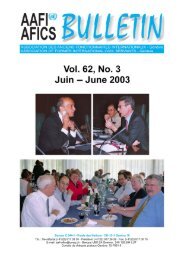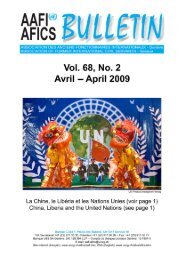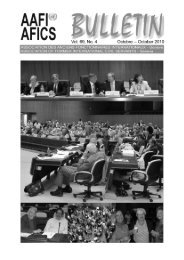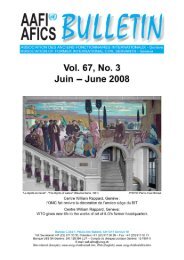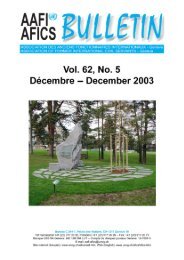Bulletin Vol. 64 no. 2 - AAFI-AFICS, Geneva - UNOG
Bulletin Vol. 64 no. 2 - AAFI-AFICS, Geneva - UNOG
Bulletin Vol. 64 no. 2 - AAFI-AFICS, Geneva - UNOG
You also want an ePaper? Increase the reach of your titles
YUMPU automatically turns print PDFs into web optimized ePapers that Google loves.
HEALTH<br />
LONG-TERM CARE : IMPORTANT PROGRESS AT THE WHO?<br />
The joint meeting of the Health Insurance Surveillance Committees was held at the WHO<br />
Headquarters on 18, 19 and 20 October 2004.<br />
The purpose of this meeting was to revise the regulations of the health insurance scheme and to<br />
examine new proposals concerning certain questions; it recommended that the principle of<br />
degressivity in the reimbursement of <strong>no</strong>n-medical expenses related to long-term care should be<br />
abolished. A final decision is <strong>no</strong>w in the hands of the Director-General.<br />
<strong>AAFI</strong>-<strong>AFICS</strong>, which has for many months been asking for the elimination of this practice in all<br />
insurance schemes of the United Nations system especially in <strong>Geneva</strong> (see the June 2004 <strong>Bulletin</strong>)<br />
welcomes this proposal that will considerably improve the coverage of long-term care. We will<br />
continue to report in the <strong>Bulletin</strong> on progress in the different organizations.<br />
¤¤¤¤¤¤¤<br />
HEALTHY AGEING - SEVEN "SECRETS" TO HEALTHY AGEI<br />
1. Develop a “social portfolio”<br />
A social portolio is like a financial portfolio. You need to (1) diversify your assets (2) have a safety net<br />
(3) start early. Your assets are the diverse interests and relationships you develop and draw upon over<br />
your lifetime. The safety net is the protection you develop when you cultivate a healthy range of<br />
interests that include group and individual activities that require high energy/high mobility as well as<br />
low energy/low mobility. The earlier you take these steps the more prepared you'll be for life as you<br />
age.<br />
Gene D. Cohen, M.D., Ph.D<br />
Director, Center on Aging, Health & Humanities<br />
George Washington University<br />
2. Remember what your mother and grandmother told you<br />
Don't abuse your body, eat well, and exercise. It's hard work, and people tend to look for easy<br />
answers to staying healthy and vigourous. But your efforts will reap considerable benefits. You'll<br />
sharply increase your chances of aging gracefully and taking advantage of opportunities to enjoy the<br />
later stages of life.<br />
William R. Hazzard, M.D.,<br />
Professor of Internal Medicine,<br />
Wake Forest University School of Medicine,<br />
and Senior Adviser, J. Paul Sticht Center on Aging<br />
3. Become a k<strong>no</strong>wledgeable health care consumer<br />
Few health care providers are trained in geriatrics, so don't assume they have all the answers.<br />
Consumers need to ask advice, get second opinions, and be advocates for themselves. In addition,<br />
they need to demand that geriatrics is included in medical school curriculums. Medical students are<br />
trained in acute care hospitals that are <strong>no</strong>t well equipped for geriatric care. Furthermore, most medical<br />
students aren't exposed to nursing homes and other elderly care facilities.<br />
33


